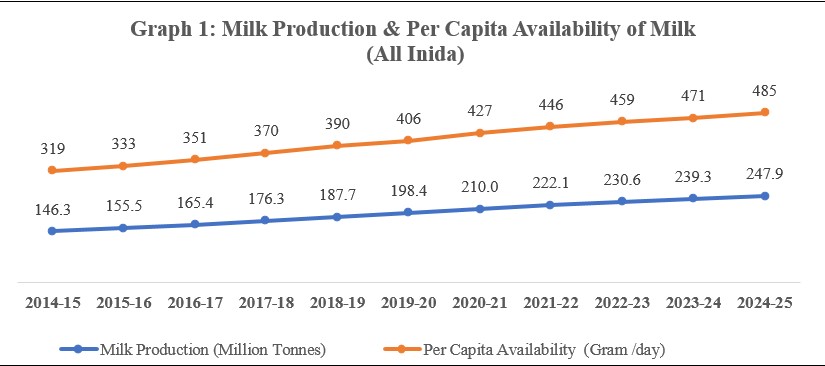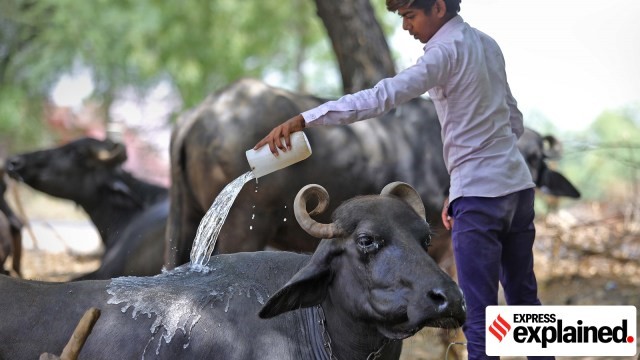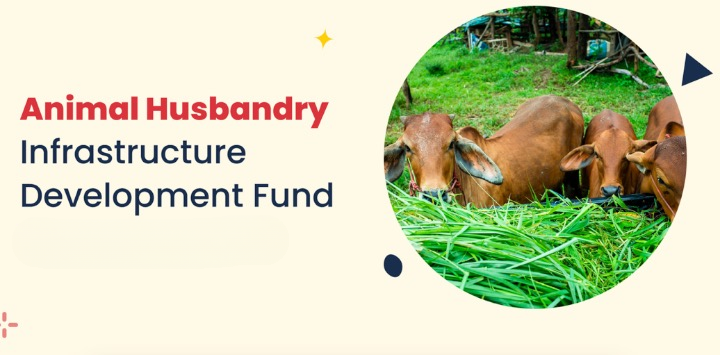Basic Animal Husbandry Statistics 2025

- 30 Nov 2025
In News:
The Ministry of Fisheries, Animal Husbandry and Dairying, in coordination with the Ministry of Panchayati Raj, released the annual publication Basic Animal Husbandry Statistics (BAHS) 2025 on National Milk Day (26 November 2025). The report presents comprehensive, state-wise data on production and per-capita availability of milk, eggs, meat and wool, based on the Integrated Sample Survey (ISS) conducted from 1 March 2024 to 29 February 2025 across three seasons—summer, rainy and winter.
Key Findings
Milk Production
- Global Rank: 1st
- Output (2024–25): 247.87 million tonnes, a 3.58% increase over 2023–24.
- Per Capita Availability: 485 g/day (up from 319 g/day in 2014–15).
- Top Producers: Uttar Pradesh (15.66%), Rajasthan (14.82%), Madhya Pradesh (9.12%), Gujarat (7.78%), Maharashtra (6.71%)—54.09% combined share.
- Growth by Source: Crossbred cattle (+4.97%), Indigenous cattle (+3.51%), Buffaloes (+2.45%).
Egg Production
- Global Rank: 2nd
- Output (2024–25): 149.11 billion eggs, 4.44% growth.
- Per Capita Availability: 106 eggs/year (up from 62 in 2014–15).
- Major Contributors: Andhra Pradesh (18.37%), Tamil Nadu (15.63%), Telangana (12.98%), West Bengal (10.72%), Karnataka (6.67%)—64.37% combined.
- Production Mix: Commercial poultry 84.49%; Backyard poultry 15.51%.
Meat Production
- Global Rank: 4th
- Output (2024–25): 10.50 million tonnes, 2.46% growth.
- Poultry Share: ~50% (5.18 million tonnes).
- Top States: West Bengal, Uttar Pradesh, Maharashtra, Andhra Pradesh, Telangana—57.55% combined.
Wool Production
- Output (2024–25): 34.57 million kg, 2.63% growth.
- Leading States: Rajasthan (47.85%), Jammu & Kashmir (22.88%), Gujarat, Maharashtra, Himachal Pradesh—85.98% combined.
PashuAushadhi Initiative

- 12 Mar 2025
In News:
The Government of India has launched the PashuAushadhi initiative to establish dedicated stores across the country offering affordable, high-quality generic veterinary medicines. This move aims to reduce the out-of-pocket expenditure of farmers and enhance animal health and productivity, especially in the livestock and dairy sectors.
Key Features:
- Modelled on PMBJK: Inspired by the success of the Pradhan Mantri BharatiyaJanaushadhiKendras (PMBJK) that provide generic human medicines, the PashuAushadhiKendras will serve the same purpose for animals.
- Affordable Veterinary Drugs: These Kendras will provide non-branded (generic) veterinary medicines at significantly lower prices.
- Ethnoveterinary Medicines: Alongside allopathic drugs, they will also stock traditional remedies based on indigenous knowledge, compiled by the National Dairy Development Board (NDDB). These include formulations for fever, diarrhoea, indigestion, mastitis, and more.
Implementation Framework
- The initiative is part of the revised Livestock Health and Disease Control Programme (LHDCP), approved by the Union Cabinet.
- Run by Co-operative Societies & PM-KisanSamriddhiKendras (PMKSKs).
- An initial budget of ?75 crore has been allocated under the LHDCP for veterinary medicine access and sales incentives.
Livestock Health and Disease Control Programme (LHDCP)
- With an outlay of ?3,880 crore for 2024–25 and 2025–26, the LHDCP focuses on:
- Prophylactic vaccination against major animal diseases (e.g., FMD, Brucellosis, CSF, PPR, Lumpy Skin Disease).
- Disease surveillance and veterinary infrastructure strengthening.
- Capacity building of veterinary services across India.
Need and Significance
- As per the 20th Livestock Census (2019), India has 535.78 million livestock, including over 302 million bovines.
- Livestock productivity is often hampered by preventable diseases.
- Farmers bear significant expenses on veterinary care, highlighting the need for cost-effective treatment options.
National Gopal Ratna Award 2024
- 26 Nov 2024
In News:
The Department of Animal Husbandry and Dairying (DAHD) declared the winners of the National Gopal Ratna Awards(NGRA); one of the highest National Awards in the field of livestock and dairy sector for the year 2024.
About the National Gopal Ratna Awards (NGRA):
- Purpose:Recognize and encourage individuals, AI technicians, dairy cooperatives, and farmer organizations in the livestock and dairy sector.
- Categories:
- Best Dairy Farmer (Indigenous Cattle/Buffalo Breeds)
- Best Artificial Insemination Technician (AIT)
- Best Dairy Cooperative/Milk Producer Company (MPC)/Dairy Farmer Producer Organization
- Addition (2024):Special awards for North Eastern Region (NER) to promote dairy development in the area, with winners in all three categories.
- and Prizes:
- Rs. 5 lakhs for 1st rank, Rs. 3 lakhs for 2nd rank, Rs. 2 lakhs for 3rd rank, and Rs. 2 lakhs for Special NER Award in the categories of Best Dairy Farmer and Best Dairy Cooperative/FPO/MPCs.
- For Best AIT, winners will receive a Certificate of Merit and a memento.
- Process:Winners selected from 2,574 applications via an online portal (https://awards.gov.in).
- The livestock sector is crucial for India's economy, contributing significantly to agriculture and providing livelihood, especially for small and marginal farmers, women, and landless laborers.
- Indigenous breeds have immense genetic potential, but their population and performance have been declining. To address this, the Rashtriya Gokul Mission was launched under the National Programme for Bovine Breeding and Dairy Development in 2014 to conserve and develop indigenous bovine breeds.
National Milk Day
- It is celebrated annually on November 26 in India to honor the significant contributions of milk and the dairy industry to the country's development.
- The day commemorates the birth anniversary of Dr VergheseKurien, the "Father of the White Revolution" in India, who played a pivotal role in transforming India into the largest producer of milk globally.
- National Milk Day was first celebrated on November 26, 2014, after the Indian Dairy Association (IDA), along with various dairy institutions across the country.
Animal Husbandry Infrastructure Development Fund (PIB)

- 02 Feb 2024
Why is it in the News?
The Union Cabinet chaired by Prime Minister Shri Narendra Modi approved the continuation of the Animal Husbandry Infrastructure Development Fund (AHIDF) to be implemented under the Infrastructure Development Fund (IDF) with an outlay of Rs.29,610.25 crore for another three years up to 2025-26.
About the Animal Husbandry Infrastructure Development Fund:
- This initiative operates as a Central Sector Scheme aimed at incentivizing investments from various entities, including individual entrepreneurs, private companies, MSMEs, Farmer’s Producers Organizations (FPOs), and Section 8 companies.
- These investments are directed towards establishing infrastructure for:
- Dairy processing and value addition
- Meat processing and value addition
- Animal feed plants
Objectives:
- Facilitating the expansion of milk and meat processing capacity and diversification of products, thereby granting unorganized rural milk and meat producers greater access to organized markets.
- Enhancing price realization for producers and ensuring the availability of quality milk and meat products for domestic consumers.
- Promoting exports and elevating the sector's contribution to export revenue.
- Providing quality concentrated animal feed to cattle, buffalo, sheep, goat, pig, and poultry, ensuring balanced rations at affordable prices.
- The Government of India offers a 3% interest subvention for a period of 8 years, including a two-year moratorium, for loans covering up to 90% of the investment.
- These loans are accessible from scheduled banks, the National Cooperative Development Corporation (NCDC), NABARD, and NDDB.
- Notably, government entities and cooperatives are excluded from availing benefits under this scheme.
What is Animal Husbandry?
- Animal husbandry encompasses the controlled cultivation, management, and production of domestic animals, with a focus on enhancing desirable qualities through breeding.
- It serves as a vital branch of agriculture dedicated to animals raised for various purposes such as meat, fibre, milk, and other products.
- This involves day-to-day care, selective breeding, and the overall management of livestock.
- In India, animal husbandry plays a crucial role in the livelihoods of many farmers, offering significant self-employment opportunities, particularly for landless labourers, small and marginal farmers, and women.
- The sector contributes to providing affordable and nutritious food to millions of Indians through the production of meat, eggs, milk, and other essential items.
- Additionally, it serves as a valuable source of raw materials such as hides, skins, bones, blood, and fat.
- Animals are often regarded as the best insurance against natural calamities like drought, famine, and other adversities, providing a degree of stability to farmers in unpredictable conditions.
